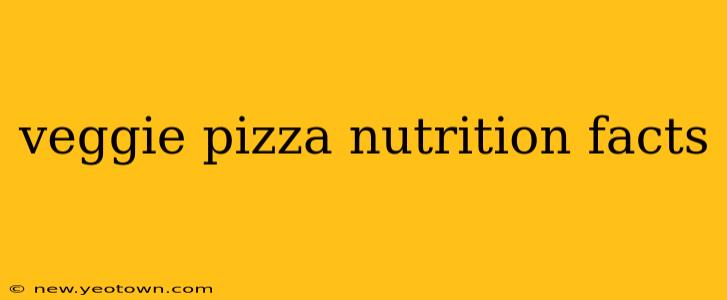Let's be honest, pizza night is a cherished ritual in many households. But the traditional pepperoni and sausage versions aren't exactly known for their health halo. Enter the veggie pizza: a vibrant, flavorful alternative that can be surprisingly nutritious. However, the nutritional content can vary wildly depending on the ingredients and preparation methods. Let's delve into the delicious details and uncover the nutritional truths behind this healthy pizza option.
What are the nutritional benefits of veggie pizza?
The beauty of veggie pizza lies in its flexibility. Imagine a canvas of whole-wheat crust, blanketed with a medley of colorful vegetables – bell peppers bursting with vitamin C, spinach packed with iron, mushrooms providing selenium, and onions contributing to a flavorful punch. This isn't just a meal; it's a nutrient powerhouse! By choosing the right ingredients, you can create a pizza that's rich in vitamins, minerals, fiber, and antioxidants – all crucial for maintaining good health. The fiber content, in particular, aids digestion and promotes satiety, helping you feel fuller for longer.
How many calories are in a veggie pizza?
This is where things get tricky. The calorie count of a veggie pizza can fluctuate significantly depending on several factors:
- Crust: A thin whole-wheat crust will generally be lower in calories than a thick, cheesy crust.
- Sauce: A simple tomato sauce is lower in calories than creamy alternatives.
- Cheese: The amount and type of cheese (mozzarella, parmesan, etc.) significantly impact the calorie count. Reduced-fat options can help.
- Veggies: While vegetables themselves are low in calories, the overall quantity can affect the total. A pizza loaded with vegetables will naturally have more calories than one with only a few.
A typical medium-sized veggie pizza might range anywhere from 500 to 800 calories, depending on the aforementioned variables. Always check the nutritional information provided by your pizza restaurant or if making it at home, carefully calculate the calories of your chosen ingredients using a nutrition calculator.
Is veggie pizza healthier than meat pizza?
Generally, yes. Veggie pizzas tend to be lower in saturated fat and cholesterol compared to meat pizzas laden with pepperoni, sausage, or bacon. The abundance of vegetables provides a significant boost of vitamins, minerals, and fiber, which are often lacking in meat-heavy pizzas. However, it's crucial to remember that the type of veggie pizza matters. A veggie pizza overloaded with cheese and a thick crust can still be quite calorie-dense.
What are the downsides of veggie pizza?
While veggie pizza offers many health benefits, it's not without potential drawbacks.
- Sodium Content: Many pizza sauces are high in sodium. Be mindful of your sodium intake, especially if you have concerns about high blood pressure.
- Hidden Sugars: Some pre-made pizza sauces contain added sugars. Opt for sugar-free or low-sugar options when possible.
- Cheese Overload: Cheese, even reduced-fat varieties, can be high in calories and fat. Moderation is key.
What are some healthy veggie pizza topping ideas?
The possibilities are endless! Here are some ideas for creating a truly nutritious veggie pizza:
- Leafy Greens: Spinach, arugula, kale.
- Colorful Vegetables: Bell peppers (red, yellow, orange), onions, mushrooms, zucchini, tomatoes.
- Nutrient-Rich Choices: Broccoli, artichoke hearts, olives.
- Herbs and Spices: Basil, oregano, parsley, garlic powder.
By consciously selecting your ingredients, you can transform your veggie pizza into a delightful and healthy meal. Remember to focus on whole-wheat crust, moderate cheese usage, and a generous helping of your favorite vegetables! Enjoy!

